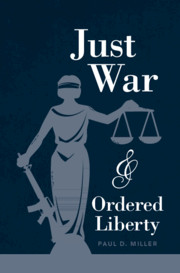Book contents
- Just War and Ordered Liberty
- Just War and Ordered Liberty
- Copyright page
- Dedication
- Epigraph
- Contents
- Acknowledgments
- 1 Thinking about War
- 2 The Augustinian Tradition
- 3 The Transition
- 4 The Westphalian Tradition
- 5 Competing Visions of a Liberal Tradition
- 6 Augustinian Liberalism
- 7 Just War and Ordered Liberty
- 8 Case Studies
- 9 Conclusion
- Works Cited
- Index
8 - Case Studies
Published online by Cambridge University Press: 08 January 2021
- Just War and Ordered Liberty
- Just War and Ordered Liberty
- Copyright page
- Dedication
- Epigraph
- Contents
- Acknowledgments
- 1 Thinking about War
- 2 The Augustinian Tradition
- 3 The Transition
- 4 The Westphalian Tradition
- 5 Competing Visions of a Liberal Tradition
- 6 Augustinian Liberalism
- 7 Just War and Ordered Liberty
- 8 Case Studies
- 9 Conclusion
- Works Cited
- Index
Summary
In this chapter I apply the Augustinian Liberal just war framework to contemporary cases of war and conflict: Iraq, Afghanistan, terrorism, Syria, North Korea, and selected cases of cyberwar and autonomous weapons. I discuss Iraq because it is the largest recent war and has animated a huge amount of commentary from just war scholars. I contrast my approach with that of several other thinkers to show the original insights of my approach. Second, I discuss Afghanistan and the War on Terror because the wars illustrate some features of the moral reality of contemporary war that I hope shape our understanding of just war in the future. Third, I use Syria to discuss humanitarian crises, the use of weapons of mass destruction, and the costs of nonintervention. Fourth, I use North Korea to discuss nuclear war, nuclear deterrence, and preemptive and preventive war – issues that have been with us since the dawn of the Cold War and are still with us. Fifth, I discuss cyberwar and autonomous weapons as novel forms of conflict whose moral dimensions are still coming into focus.
Keywords
Information
- Type
- Chapter
- Information
- Just War and Ordered Liberty , pp. 200 - 249Publisher: Cambridge University PressPrint publication year: 2021
